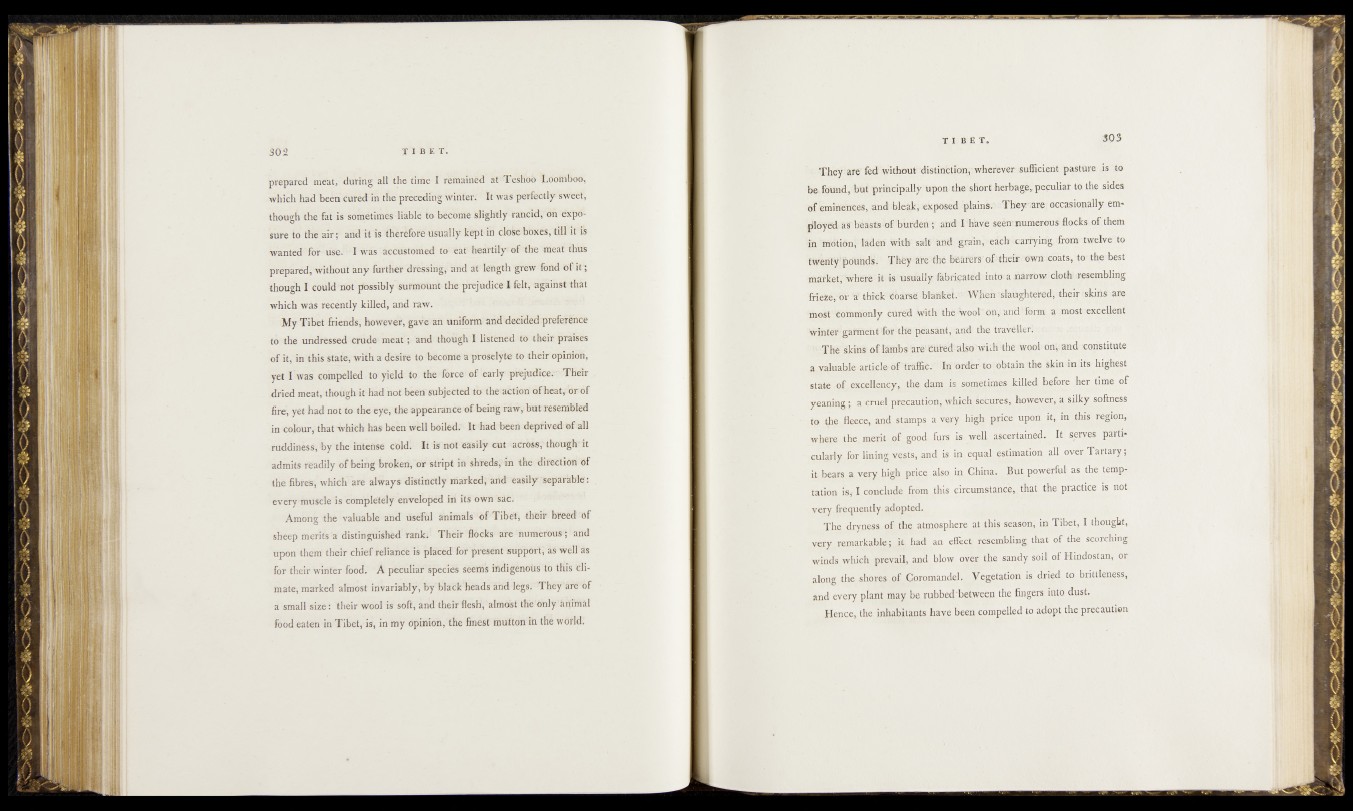
prepared meat, during all the time I remaified èt ' TeÉföÖ tofotaSboO,
which had héén cured in the preceding winter; It was perfectly 'SWbét;
though the fat is sometimes liihlé to bëcómé Slightly rancidy'dh exposure
to the air; and it is therefore usually kept in cIohebbKes, till it is
wanted'for use. I was accustomed1 to 'eat heartily' of‘the meat thus
prepared, without any further dressiiigv and at length grew fond- b'P it *;
though I could not possibly suitaeimt the prejudice I felt, againstthat
which was recently lulled, and raw.
My Tibet friends, however, gave an uniform and decided :prefcfèhce
tó the undressed crude m eat; and though ! listened !tb-their.-praises
of it, in this state, with a desire to becóme a proselyte tö tbdr öpiiïi&l,
yet I was compelled to yield to the force- of early prejudice:;' Their
dried meat. thoughifhad not been subjected tö the-'action' of hcat/Ör?óf
fire; yet had not to the eye, the appearance of being rciwy but-resembled
in colour, that Which has been wëll boiled; it had been deprived of all
ruddiness, ;by the intense cold: It is not easily cut across,'though-it
admits readily of being broken, or stript in shreds,' in the- direction Of
the fibres, which’are always distinctly marked; and easily 'Separable:
everymuscle is completely enveloped id its own sifC;
Among the valuable and useful amroals~'öf Tibet; their breed!’0f
sheep merits 'a distinguished rank; Their flocks are numerous'; and
upon them their chief reliance is placed: for present support; as well as
for their winter food. A peculiar speciés seeniis indigenous to this climate;
marked almost invariably, by blackheads and legs.- Théy arë óf
a small size: their wool is soft, and their flesh, ‘almo'st the'Only 'hq'Mal
food eaten in Tibet, is, in my Opinion, the finest mutton in thé wörld.
T I B E T. 303
i- They;are' fed withouf ?distinfctfon,'iwherever sufficient pasture as to
be. fóünd, bul prihcipally ttpon the sfiórÉherbage’,.pcpubar to. the sides
öfémiiïehCeS, and èje^fexposéd %lMS.ocThey’jarej occasionally em~
riloyedar beasts -of burden; and I hSave seem nnmerourfflocksiof them
in hidtiOnpladett with salf and grain,ï*.fe^dT--£carfyiii)g drom twehre.to
tWéütyipóühds. Thèy ate-thé feëaibfS'ofn-beir ownicoiats/to^ the best
market, Vherè it is usually fabricated inhita narrow-cloth sresembling
frïekel'bf'V tfeick'dbarsd-bMcfel/1' WJieh 'slaughtek;dr their -skins are
‘most''Commonly cured with thëdvooï'öfi*,4and'ferm a most-excellent
‘Wbitèi^ga^êh#d0r'dlïe;j^sant',^^rtfee tmydlferl-';?*.
"■ Thé skins of lambs constitute
a valuable article oflr&ffie.'' In ‘ordèr to‘obtain'the skin in.its-highest
state of excellency, the dam i%spmetimes jdlled before her time^jjf
yeaning; a cruel precaution, which seoires, however,^arilkwsoftn^s
to the fleece, and stamps a very high-price upon it, m this region,
where-the. merit of good furs is wel^a^ertaihed. ^ It sejyes particularly
for lining vests, and is in equal.es^iation all over Tartary;
it bears a very high price also in China. B i| powerful as the temptation
is, I conclude from this circumstancp^ that the practice is not
very frequently: gioptpd.
The dryness of the atmosphere at this season, in Tibet, I thought,
very remarkable ; it had an effect resembling that óf the scorching
winds which prevail, and blow over the sandy soil of Hindostan, or
along the shores of Coromandel. Vegetation is dried to brittleness,
and every plant may be rubbed‘between the fingers, into dus,t.;
Hence, the inhabitants have been compelled to adopt the precaution